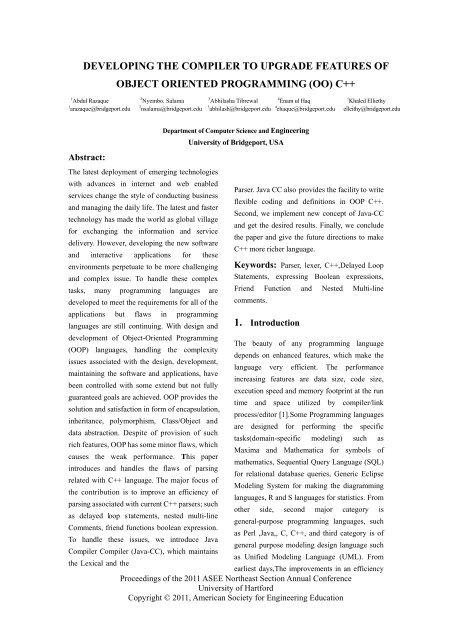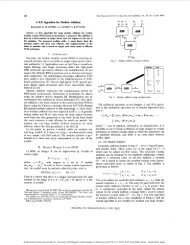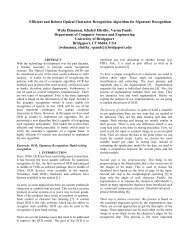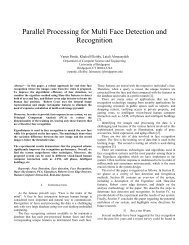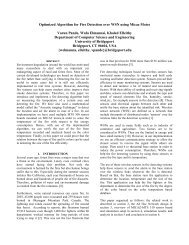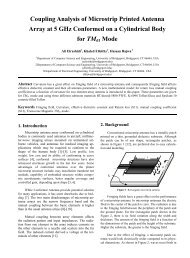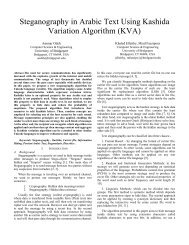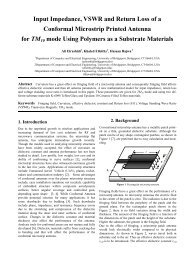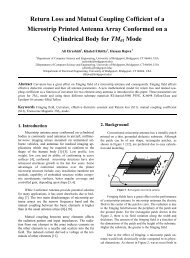Developing the Compiler to upgrade the features of ... - ResearchGate
Developing the Compiler to upgrade the features of ... - ResearchGate
Developing the Compiler to upgrade the features of ... - ResearchGate
Create successful ePaper yourself
Turn your PDF publications into a flip-book with our unique Google optimized e-Paper software.
DEVELOPING THE COMPILER TO UPGRADE FEATURES OF<br />
OBJECT ORIENTED PROGRAMMING (OO) C++<br />
1 Abdul Razaque<br />
1 arazaque@bridgeport.edu<br />
2 Nyembo. Salama<br />
3 Abhilasha Tibrewal<br />
4 Enam ul Haq<br />
5 Khaled Elliethy<br />
2 nsalama@bridgeport.edu 3 abhilash@bridgeport.edu 4 ehaque@bridgeport.edu elleithy@bridgeport.edu<br />
Abstract:<br />
The latest deployment <strong>of</strong> emerging technologies<br />
with advances in internet and web enabled<br />
services change <strong>the</strong> style <strong>of</strong> conducting business<br />
and managing <strong>the</strong> daily life. The latest and faster<br />
technology has made <strong>the</strong> world as global village<br />
for exchanging <strong>the</strong> information and service<br />
delivery. However, developing <strong>the</strong> new s<strong>of</strong>tware<br />
and interactive applications for <strong>the</strong>se<br />
environments perpetuate <strong>to</strong> be more challenging<br />
and complex issue. To handle <strong>the</strong>se complex<br />
tasks, many programming languages are<br />
developed <strong>to</strong> meet <strong>the</strong> requirements for all <strong>of</strong> <strong>the</strong><br />
applications but flaws in programming<br />
languages are still continuing. With design and<br />
Department <strong>of</strong> Computer Science and Engineering<br />
University <strong>of</strong> Bridgeport, USA<br />
Parser. Java CC also provides <strong>the</strong> facility <strong>to</strong> write<br />
flexible coding and definitions in OOP C++.<br />
Second, we implement new concept <strong>of</strong> Java-CC<br />
and get <strong>the</strong> desired results. Finally, we conclude<br />
<strong>the</strong> paper and give <strong>the</strong> future directions <strong>to</strong> make<br />
C++ more richer language.<br />
Keywords: Parser, lexer, C++,Delayed Loop<br />
Statements, expressing Boolean expressions,<br />
Friend Function and Nested Multi-line<br />
comments.<br />
1. Introduction<br />
development <strong>of</strong> Object-Oriented Programming<br />
The beauty <strong>of</strong> any programming language<br />
(OOP) languages, handling <strong>the</strong> complexity<br />
depends on enhanced <strong>features</strong>, which make <strong>the</strong><br />
issues associated with <strong>the</strong> design, development,<br />
language very efficient. The performance<br />
maintaining <strong>the</strong> s<strong>of</strong>tware and applications, have<br />
increasing <strong>features</strong> are data size, code size,<br />
been controlled with some extend but not fully<br />
execution speed and memory footprint at <strong>the</strong> run<br />
guaranteed goals are achieved. OOP provides <strong>the</strong><br />
time and space utilized by compiler/link<br />
solution and satisfaction in form <strong>of</strong> encapsulation,<br />
process/edi<strong>to</strong>r [1].Some Programming languages<br />
inheritance, polymorphism, Class/Object and<br />
are designed for performing <strong>the</strong> specific<br />
data abstraction. Despite <strong>of</strong> provision <strong>of</strong> such<br />
tasks(domain-specific modeling) such as<br />
rich <strong>features</strong>, OOP has some minor flaws, which<br />
Maxima and Ma<strong>the</strong>matica for symbols <strong>of</strong><br />
causes <strong>the</strong> weak performance. This paper<br />
ma<strong>the</strong>matics, Sequential Query Language (SQL)<br />
introduces and handles <strong>the</strong> flaws <strong>of</strong> parsing<br />
for relational database queries, Generic Eclipse<br />
related with C++ language. The major focus <strong>of</strong><br />
Modeling System for making <strong>the</strong> diagramming<br />
<strong>the</strong> contribution is <strong>to</strong> improve an efficiency <strong>of</strong><br />
languages, R and S languages for statistics. From<br />
parsing associated with current C++ parsers; such<br />
o<strong>the</strong>r side, second major category is<br />
as delayed loop statements, nested multi-line<br />
general-purpose programming languages, such<br />
Comments, friend functions boolean expression.<br />
as Perl ,Java,, C, C++, and third category is <strong>of</strong><br />
To handle <strong>the</strong>se issues, we introduce Java<br />
general purpose modeling design language such<br />
<strong>Compiler</strong> <strong>Compiler</strong> (Java-CC), which maintains<br />
as Unified Modeling Language (UML). From<br />
<strong>the</strong> Lexical and <strong>the</strong><br />
earliest days,The improvements in an efficiency<br />
Proceedings <strong>of</strong> <strong>the</strong> 2011 ASEE Nor<strong>the</strong>ast Section Annual Conference<br />
University <strong>of</strong> Hartford<br />
Copyright © 2011, American Society for Engineering Education
<strong>of</strong> programming languages have been a major<br />
focusing design goals. The designer also tried <strong>to</strong><br />
integrate <strong>the</strong> zero overhead rule for those <strong>features</strong>,<br />
which are not used in a program [1].On <strong>the</strong> basis<br />
<strong>of</strong> this principle, C++ has been designed with<br />
more extra rich <strong>features</strong> such as Object-Oriented<br />
<strong>features</strong> including encapsulation in classes, use<br />
<strong>of</strong> construc<strong>to</strong>rs, destruc<strong>to</strong>rs. Inheritance,<br />
Polymorphism, which provide run-time selection,<br />
Generic programming such as functions,<br />
template classes, member functions, Exception<br />
handling, Garbage collection, Persistence,<br />
Standard library and Missing [3]. Despite <strong>of</strong> all<br />
<strong>the</strong>se healthier <strong>features</strong>, C++ faces some minor<br />
issues, which cause <strong>the</strong> lack <strong>of</strong> performance and<br />
compatibility. Our contribution highlights those<br />
issues and provides <strong>the</strong> solutions <strong>to</strong> make <strong>the</strong><br />
C++ more versatile language. Modifications <strong>to</strong><br />
C++ language in widespread is not easy task<br />
and even slightly changes require linguistic<br />
discussion [2]. we present here limitations <strong>of</strong><br />
C++ such as Delayed Loop Statements,<br />
expressing Boolean expressions as digits, Friend<br />
Function and Nested Multi-line comments. To<br />
this conclusion, we deem that this paper makes<br />
reasonable contribution. The rest <strong>of</strong> <strong>the</strong> paper<br />
is organized as follows. In Section II, We<br />
highlight <strong>the</strong> limitations with proposed<br />
implementation and finally conclude <strong>the</strong> paper.<br />
2. Methodology and Proposed<br />
Implementation<br />
To tackle <strong>the</strong> weak points <strong>of</strong> C++ language,<br />
we introduce <strong>the</strong> new idea with integration <strong>of</strong><br />
Lexer and parser supported with Java compiler<br />
(JAVACC). This new concept <strong>of</strong> combining <strong>the</strong><br />
<strong>features</strong> <strong>of</strong> programming and parser code gives<br />
<strong>the</strong> functionality <strong>of</strong> compiler and introduces <strong>the</strong><br />
novel way <strong>of</strong> solving <strong>the</strong> problem.<br />
To tackle this issue, we use our compiler <strong>to</strong> solve<br />
<strong>the</strong> problem. We give simple an example<br />
while(1){...} // while contains non Boolean<br />
expression<br />
for (int x =0; 1; x++) {...} // for contains<br />
non_Boolean expression<br />
To handle <strong>the</strong> above weakness; <strong>the</strong> following<br />
sample code is <strong>the</strong> best solution<br />
( | | Arithmetic Operation ())<br />
Boolean Operation()<br />
( | |<br />
| < DOUBLED>) ( ( |<br />
<br />
(<br />
| Arithmetic Operation ()) Boolean Operation()<br />
( | | | <<br />
DOUBLED>)<br />
2.2 Delayed Loop Statements<br />
They causes <strong>the</strong> endless loops, To resolve this<br />
issue, we need <strong>to</strong> set clock concept <strong>to</strong> delay <strong>the</strong><br />
program .The following simple program shows<br />
<strong>the</strong> delayed loop statement.<br />
for(int i=0;i
They are non-member function <strong>of</strong> o<strong>the</strong>r classes,<br />
which access <strong>the</strong> protected and private members<br />
<strong>of</strong> a class within <strong>the</strong> scope <strong>of</strong> <strong>the</strong> class but not<br />
out side <strong>of</strong> <strong>the</strong> class (main function).<br />
non-member function are declared inside <strong>the</strong><br />
class as friends by using <strong>the</strong> keyword friend. If<br />
<strong>the</strong> friends functions are declared in order <strong>to</strong><br />
access <strong>the</strong> protected and public data members<br />
and member functions but why <strong>the</strong>y do not have<br />
access <strong>to</strong> protected and private date members in<br />
main function. To resolve this weakness, our<br />
designed front end part <strong>of</strong> <strong>the</strong> compiler, <strong>the</strong> lexer<br />
and <strong>the</strong> parser, showed promising results <strong>to</strong><br />
fulfill <strong>the</strong> objectives by providing a complete<br />
solution <strong>to</strong> <strong>the</strong> Friend<br />
class Object : private class1,private class2<br />
{<br />
private:<br />
protected:<br />
Public:<br />
public:<br />
int y;<br />
int y;<br />
// member functions<br />
void func3(){}<br />
Object(){z=4;}<br />
void func1(){}<br />
friend void get_function(Product s)<br />
{<br />
s->x;<br />
t.n;<br />
s.func1();<br />
s->func2(g);<br />
int a,b;<br />
cout
SKIP;<br />
{<br />
Conclusion:<br />
}<br />
{multilinecomments++;counter<br />
--;<br />
if(counter==0)<br />
{<br />
Switch To (DEFAULT);<br />
} }<br />
In this paper, we have discussed <strong>the</strong> weakness <strong>of</strong><br />
object oriented Programming Language C++<br />
such as delayed loop statements, nested<br />
multi-line comments, friends functions and<br />
Boolean expressions, which affects <strong>the</strong> beauty <strong>of</strong><br />
language. To resolve this issue, we have<br />
developed compiler, which integrates <strong>the</strong><br />
<strong>features</strong> <strong>of</strong> laxer and parser. To achieve <strong>the</strong><br />
objectives, we have provided <strong>the</strong> best solutions<br />
with deployment <strong>of</strong> developed compiler. This<br />
small effort can motivate <strong>the</strong> people <strong>to</strong> utilize<br />
<strong>the</strong>ir best efforts <strong>to</strong> improve programming<br />
languages by removing <strong>the</strong> minor bugs and make<br />
<strong>the</strong> programming languages more flexible and<br />
feature-oriented as much as possible. In future,<br />
we will discuss <strong>the</strong> important <strong>features</strong> <strong>of</strong><br />
polymorphisms, construc<strong>to</strong>r and destruc<strong>to</strong>r in<br />
classes.<br />
Acknowledgement<br />
Thanks <strong>to</strong> Pr<strong>of</strong>essor Abhilasha Tibrewal who<br />
provided <strong>the</strong> valuable support through her best<br />
teaching method. Due <strong>to</strong> her expertise in C++<br />
made this small but meaningful effort possible<br />
and thanks <strong>to</strong> Pr<strong>of</strong>essor Khaled Elliethy who<br />
advised <strong>to</strong> take <strong>the</strong> course C++. We are also<br />
grateful <strong>to</strong> Semantic and distributed computing<br />
network (SDCN) group, Mohammad Ali Jinnah<br />
University, Islamabad Pakistan who helped in<br />
implementing <strong>the</strong> ideas <strong>of</strong> integrating <strong>the</strong> lexer<br />
and parser <strong>to</strong> handle <strong>the</strong> weakness <strong>of</strong> C++<br />
language.<br />
References:<br />
[1].Dave Abrahams, Mike Ball et al.,<br />
"Technical Report on C++ Performance",<br />
ISO/IEC PDTR 18015, August 11, 2003.<br />
[2]. Bjarne Stroustrup,"C and C++: Case Studies<br />
in Compatibility”, Part <strong>of</strong> a three-article<br />
series from "The C/C++ Users<br />
Journal", AT&T Labs, July-September<br />
2002.<br />
[3]. Douglas C. Schmidt," An Overview <strong>of</strong><br />
C++",<br />
Proceedings <strong>of</strong> <strong>the</strong> 2011 ASEE Nor<strong>the</strong>ast Section Annual Conference<br />
University <strong>of</strong> Hartford<br />
Copyright © 2011, American Society for Engineering Education


